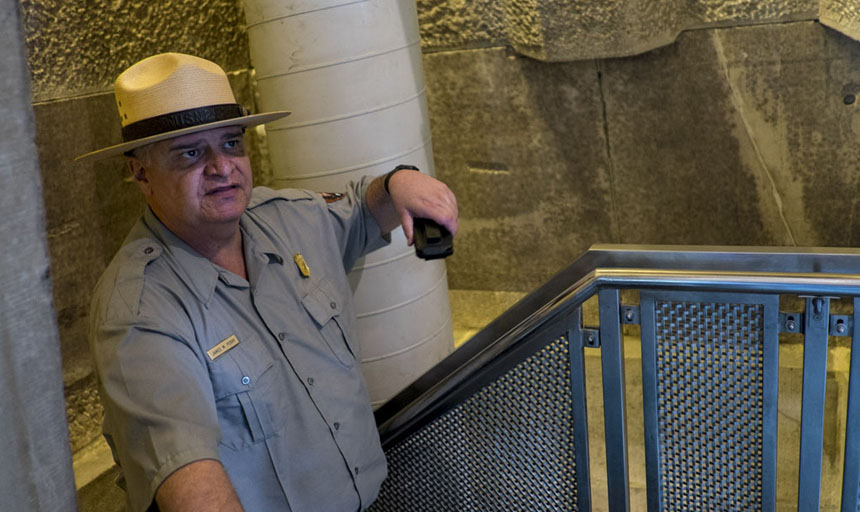Managing the Monument
November 21, 2014

James Perry '82 is chief resource management officer for the National Parks Service.
James Perry '82 helps care for our nation's symbolic backyard. Perry, who serves as chief resource management officer for the National Parks Service, in Washington, D.C., says that his job is, without a doubt, a labor of love.
"Our resources are just so iconic," Perry says of the nation's most-visited national park. The National Mall and Memorial Parks, located mostly between the U.S. Capitol and the Washington Monument, is home to the Lincoln and Jefferson memorials, Tidal Basin, and many other memorials and monuments visited by millions every year.
Perry takes great satisfaction in work on behalf of the National Mall, plus more than 150 "uptown reservations" (including well-known spots such as Dupont Circle, Farragut Square and Franklin Park) also included in the National Park. That work, he says, benefits visitors to Washington, the District's residents and the future generations of both.
Perry and his team manage natural and cultural assets, including turf and wildlife, and maintain the historic elements of the properties. Perry and his staff also make recommendations to the park superintendent about caring for the national treasures under their purview, and they work with congressional commissions to be sure the work is in compliance with federal law.
"Everything that happens on the National Mall goes before a congressional commission," says Perry.
Overseeing museum curators, historians and natural resource managers means busy days year-round for Perry. "One of the things that attracted me to the Parks Service is that there is so much variety," he says. "You have to be very much a generalist. No two days here are ever the same."
As with all things in a post-9/11 world and especially in Washington, there are also issues of security. After D.C. experienced a 5.8-magnitude earthquake in the summer of 2011, Perry's team was forced to close the Washington Monument to visitors. "It's basically a standard masonry repair job," Perry said of the project. "It's just that it's 500 feet in the air and across the street from the White House...It means that if the president's helicopter is going to fly over, we have to get the workers off the scaffolding."
The monument reopened to visitors in May after a $15 million, nearly three-year restoration.
"I consider myself a historian...I'm just not doing it in a classic sense," Perry says.
Perhaps Perry's interest in history can be attributed to tracing his family to the 1630s in Jamestown, Va. In part because of that bit of personal history, he says he always wanted to attend a small college in Virginia - and that Roanoke was a great fit for him.
Perry remembers Roanoke's history department fondly, saying that he found "fascinating people and fascinating courses" at the College. He credits his academic advisor, Dr. Susan Millinger, and Professor Mark Miller, with helping shape his path. An internship with the Roanoke Valley Historical Society was his introduction to work with organizations focused on preservation. As a Roanoke student, Perry worked summers as a National Parks Service tour guide and later became a field ranger.
Given his roots, it only made sense that this history major landed at The College of William and Mary in Colonial Williamsburg after receiving his degree from Roanoke. There he also studied history, graduating with a master's degree.
Perry has since lived and worked in Florida, New York, D.C., Virginia, and Maryland. He has worked for the United States Supreme Court, Colonial Williamsburg, the American Red Cross, and other parks and historical organizations. He says he is comfortable wherever there is rich history in which he can immerse himself. His office, tucked away in a historic stucco building along the Potomac River, is certainly one of those places.
Perry says he has come home - to Washington, D.C., to resource management and to the National Parks Service.
"In my career, I have reached the point where I'm trying to instill the preservation ethic in the next generation," he says. "I have realized that I won't be able to work at every national park. I just want to see this work continue."
- Traci Crockett Moe '01